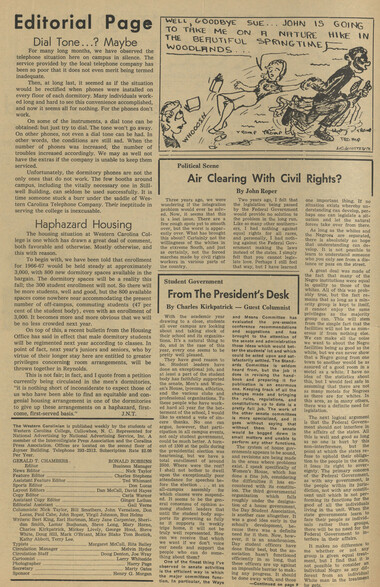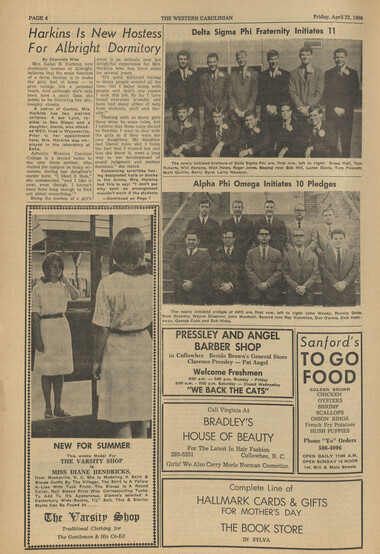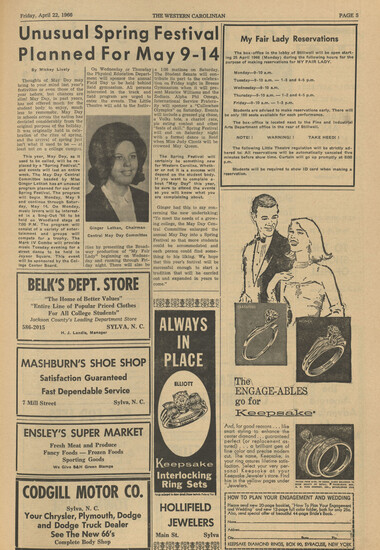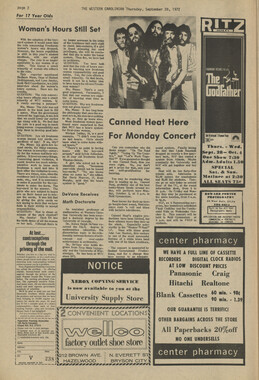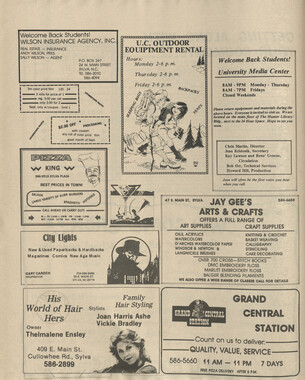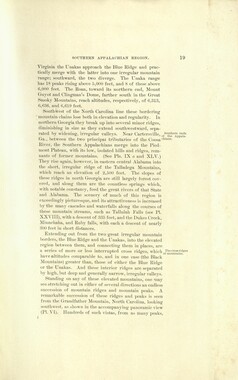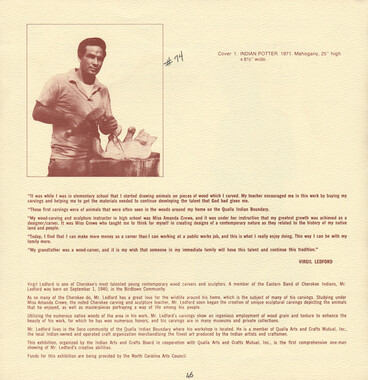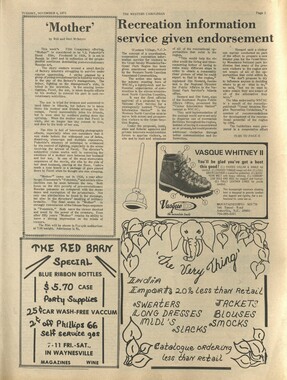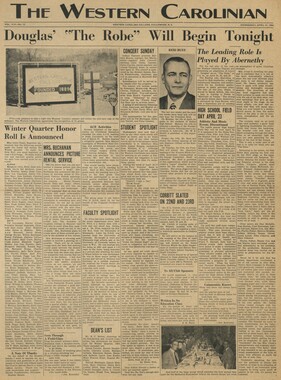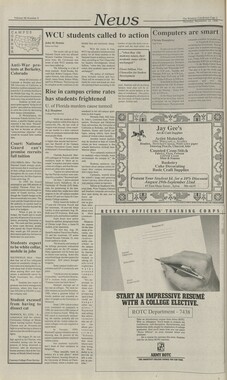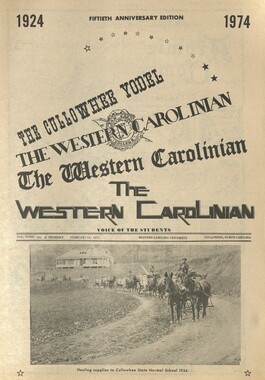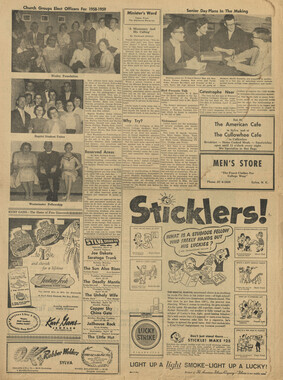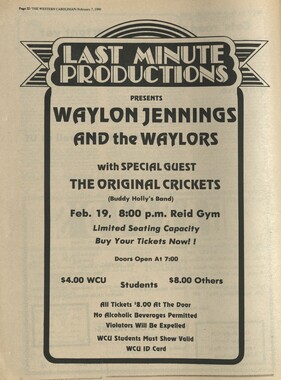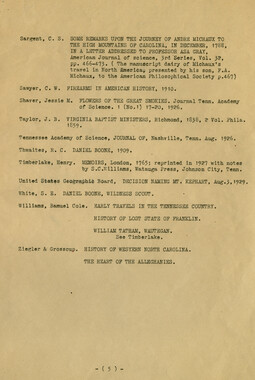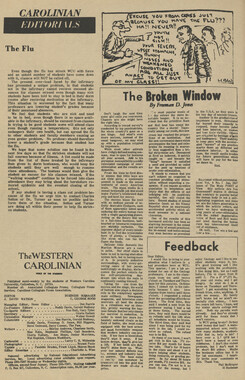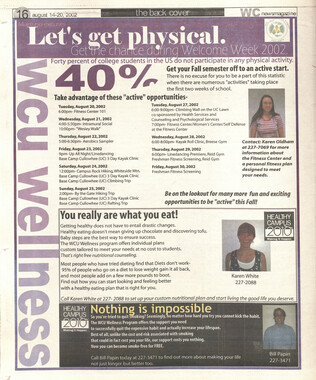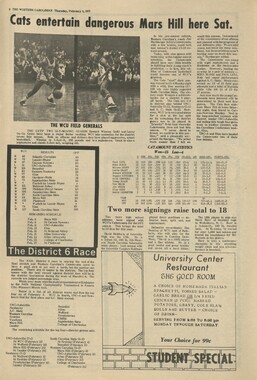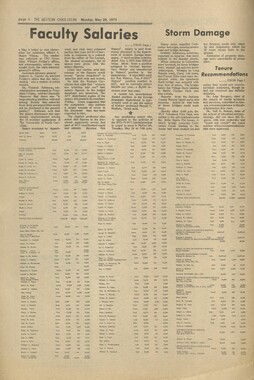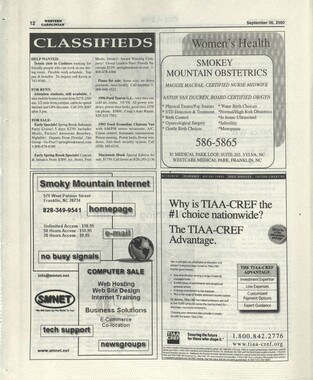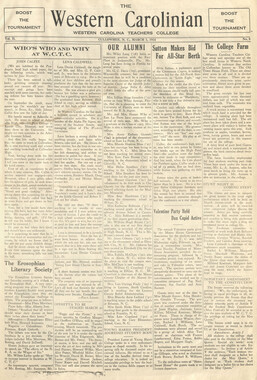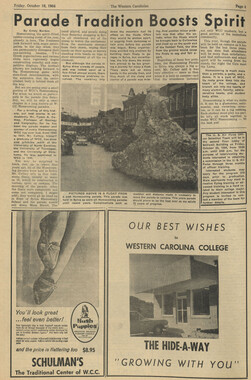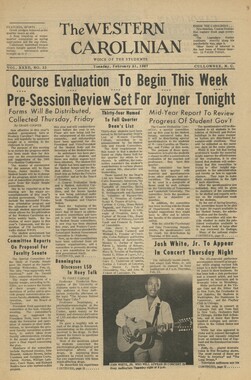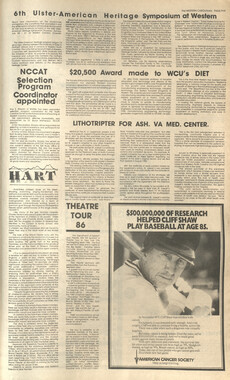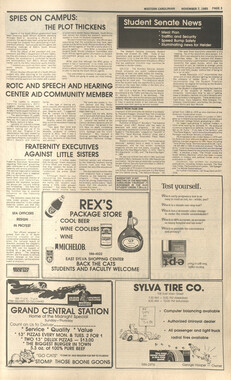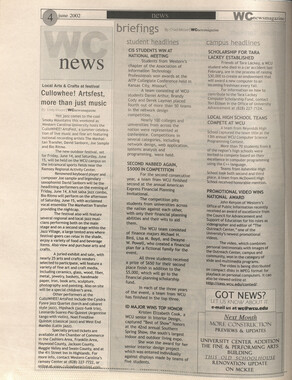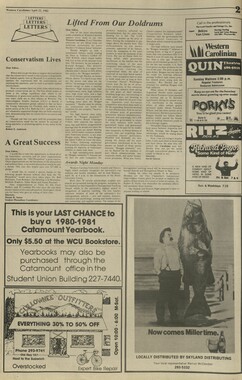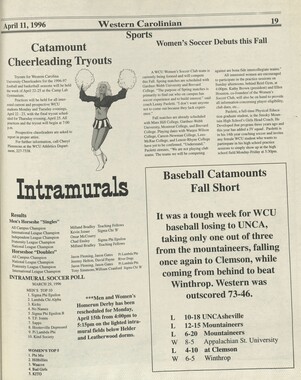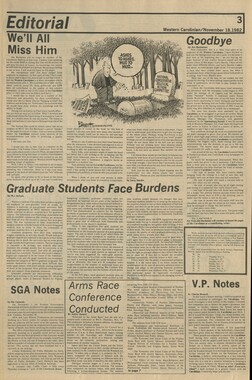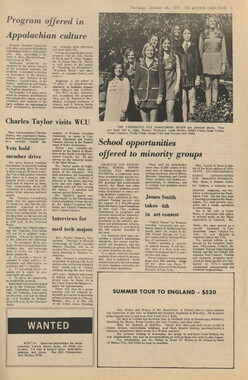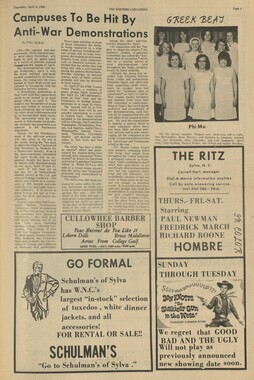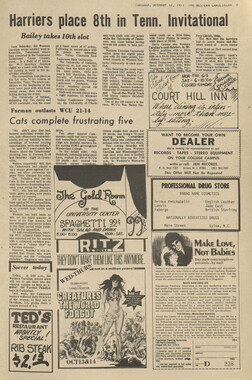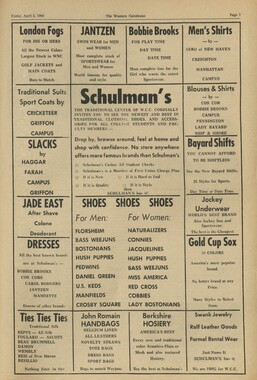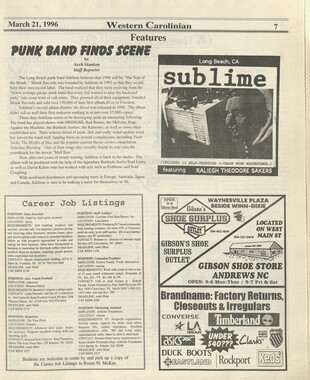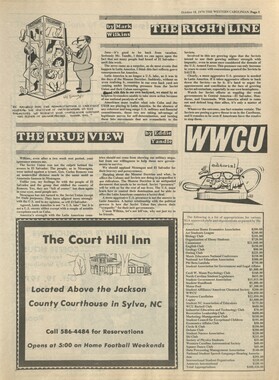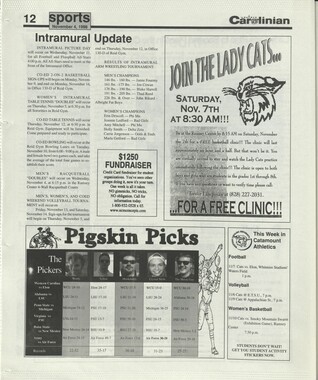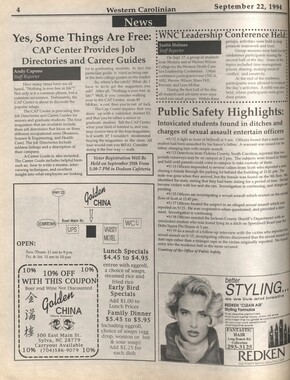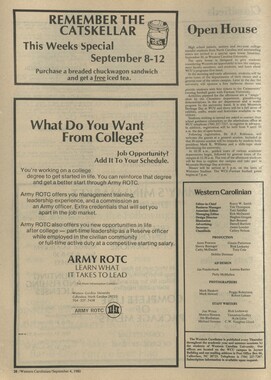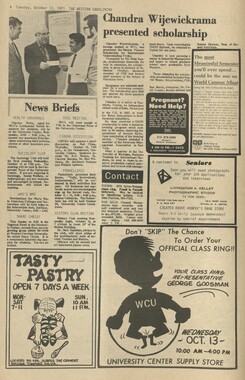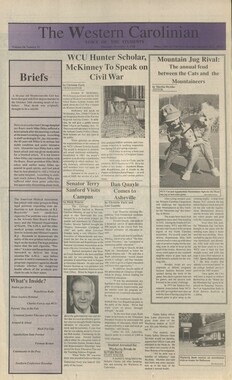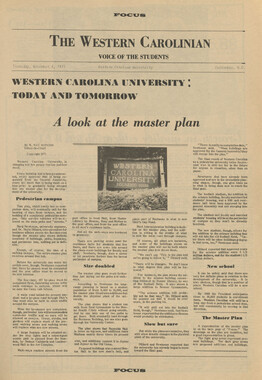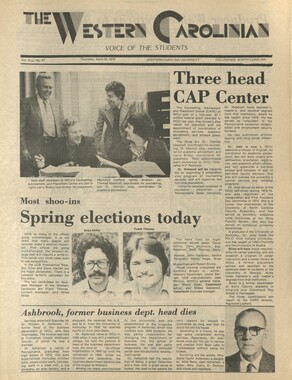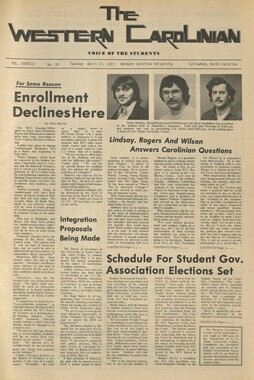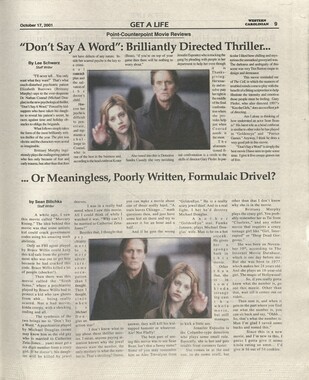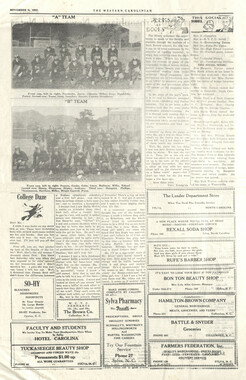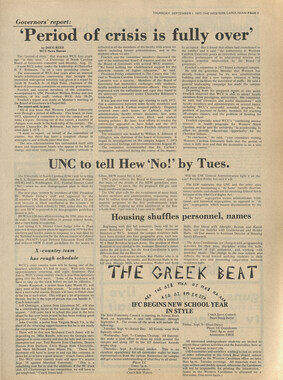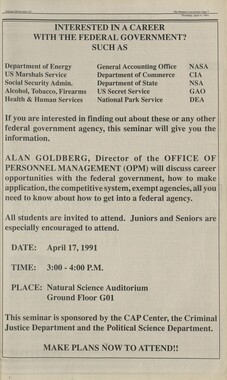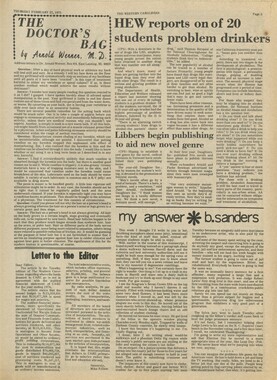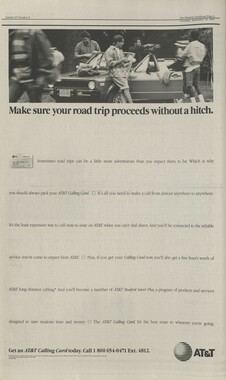Western Carolina University (20)
View all
- Canton Champion Fibre Company (2308)
- Cherokee Traditions (292)
- Civil War in Southern Appalachia (165)
- Craft Revival (1942)
- Great Smoky Mountains - A Park for America (2766)
- Highlights from Western Carolina University (430)
- Horace Kephart (941)
- Journeys Through Jackson (154)
- LGBTQIA+ Archive of Jackson County (85)
- Oral Histories of Western North Carolina (314)
- Picturing Appalachia (6772)
- Stories of Mountain Folk (413)
- Travel Western North Carolina (160)
- Western Carolina University Fine Art Museum Vitreograph Collection (129)
- Western Carolina University Herbarium (92)
- Western Carolina University: Making Memories (708)
- Western Carolina University Publications (2283)
- Western Carolina University Restricted Electronic Theses and Dissertations (146)
- Western North Carolina Regional Maps (71)
- World War II in Southern Appalachia (131)
University of North Carolina Asheville (6)
View all
- Allanstand Cottage Industries (62)
- Appalachian National Park Association (53)
- Bennett, Kelly, 1890-1974 (1388)
- Berry, Walter (76)
- Brasstown Carvers (40)
- Carver, George Washington, 1864?-1943 (26)
- Cathey, Joseph, 1803-1874 (1)
- Champion Fibre Company (233)
- Champion Paper and Fibre Company (297)
- Cherokee Indian Fair Association (16)
- Cherokee Language Program (22)
- Crowe, Amanda (40)
- Edmonston, Thomas Benton, 1842-1907 (7)
- Ensley, A. L. (Abraham Lincoln), 1865-1948 (275)
- Fromer, Irving Rhodes, 1913-1994 (70)
- George Butz (BFS 1907) (46)
- Goodrich, Frances Louisa (120)
- Grant, George Alexander, 1891-1964 (96)
- Heard, Marian Gladys (60)
- Kephart, Calvin, 1883-1969 (15)
- Kephart, Horace, 1862-1931 (313)
- Kephart, Laura, 1862-1954 (39)
- Laney, Gideon Thomas, 1889-1976 (439)
- Masa, George, 1881-1933 (61)
- McElhinney, William Julian, 1896-1953 (44)
- Niggli, Josephina, 1910-1983 (10)
- North Carolina Park Commission (105)
- Osborne, Kezia Stradley (9)
- Owens, Samuel Robert, 1918-1995 (11)
- Penland Weavers and Potters (36)
- Roberts, Vivienne (15)
- Roth, Albert, 1890-1974 (142)
- Schenck, Carl Alwin, 1868-1955 (1)
- Sherrill's Photography Studio (2565)
- Southern Highland Handicraft Guild (127)
- Southern Highlanders, Inc. (71)
- Stalcup, Jesse Bryson (46)
- Stearns, I. K. (213)
- Thompson, James Edward, 1880-1976 (226)
- United States. Indian Arts and Crafts Board (130)
- USFS (683)
- Vance, Zebulon Baird, 1830-1894 (1)
- Weaver, Zebulon, 1872-1948 (58)
- Western Carolina College (230)
- Western Carolina Teachers College (282)
- Western Carolina University (1794)
- Western Carolina University. Mountain Heritage Center (18)
- Whitman, Walt, 1819-1892 (10)
- Wilburn, Hiram Coleman, 1880-1967 (73)
- Williams, Isadora (3)
- Cain, Doreyl Ammons (0)
- Crittenden, Lorraine (0)
- Rhodes, Judy (0)
- Smith, Edward Clark (0)
- Appalachian Region, Southern (2569)
- Asheville (N.C.) (1923)
- Avery County (N.C.) (26)
- Blount County (Tenn.) (161)
- Buncombe County (N.C.) (1672)
- Cherokee County (N.C.) (283)
- Clay County (N.C.) (555)
- Graham County (N.C.) (233)
- Great Smoky Mountains National Park (N.C. and Tenn.) (519)
- Haywood County (N.C.) (3524)
- Henderson County (N.C.) (70)
- Jackson County (N.C.) (4694)
- Knox County (Tenn.) (25)
- Knoxville (Tenn.) (12)
- Lake Santeetlah (N.C.) (10)
- Macon County (N.C.) (420)
- Madison County (N.C.) (212)
- McDowell County (N.C.) (39)
- Mitchell County (N.C.) (132)
- Polk County (N.C.) (35)
- Qualla Boundary (981)
- Rutherford County (N.C.) (76)
- Swain County (N.C.) (2115)
- Transylvania County (N.C.) (270)
- Watauga County (N.C.) (12)
- Waynesville (N.C.) (84)
- Yancey County (N.C.) (72)
- Aerial Photographs (3)
- Aerial Views (60)
- Albums (books) (4)
- Articles (1)
- Artifacts (object Genre) (228)
- Bibliographies (1)
- Biography (general Genre) (2)
- Cards (information Artifacts) (38)
- Clippings (information Artifacts) (191)
- Crafts (art Genres) (622)
- Depictions (visual Works) (21)
- Design Drawings (1)
- Drawings (visual Works) (184)
- Envelopes (73)
- Facsimiles (reproductions) (1)
- Fiction (general Genre) (4)
- Financial Records (12)
- Fliers (printed Matter) (67)
- Glass Plate Negatives (381)
- Guidebooks (2)
- Internegatives (10)
- Interviews (815)
- Land Surveys (102)
- Letters (correspondence) (1013)
- Manuscripts (documents) (618)
- Maps (documents) (177)
- Memorandums (25)
- Minutes (administrative Records) (59)
- Negatives (photographs) (5835)
- Newsletters (1285)
- Newspapers (2)
- Occupation Currency (1)
- Paintings (visual Works) (1)
- Pen And Ink Drawings (1)
- Periodicals (193)
- Personal Narratives (10)
- Photographs (12976)
- Plans (maps) (1)
- Poetry (6)
- Portraits (4533)
- Postcards (329)
- Programs (documents) (151)
- Publications (documents) (2236)
- Questionnaires (65)
- Scrapbooks (282)
- Sheet Music (2)
- Slides (photographs) (402)
- Songs (musical Compositions) (2)
- Sound Recordings (796)
- Specimens (92)
- Speeches (documents) (15)
- Tintypes (photographs) (8)
- Transcripts (322)
- Video Recordings (physical Artifacts) (23)
- Vitreographs (129)
- Text Messages (0)
- A.L. Ensley Collection (275)
- Appalachian Industrial School Records (7)
- Appalachian National Park Association Records (336)
- Axley-Meroney Collection (2)
- Bayard Wootten Photograph Collection (20)
- Bethel Rural Community Organization Collection (7)
- Blumer Collection (5)
- C.W. Slagle Collection (20)
- Canton Area Historical Museum (2110)
- Carlos C. Campbell Collection (282)
- Cataloochee History Project (64)
- Cherokee Studies Collection (4)
- Daisy Dame Photograph Album (5)
- Daniel Boone VI Collection (1)
- Doris Ulmann Photograph Collection (112)
- Elizabeth H. Lasley Collection (1)
- Elizabeth Woolworth Szold Fleharty Collection (4)
- Frank Fry Collection (95)
- George Masa Collection (173)
- Gideon Laney Collection (452)
- Hazel Scarborough Collection (2)
- Hiram C. Wilburn Papers (28)
- Historic Photographs Collection (236)
- Horace Kephart Collection (861)
- Humbard Collection (33)
- Hunter and Weaver Families Collection (1)
- I. D. Blumenthal Collection (4)
- Isadora Williams Collection (4)
- Jesse Bryson Stalcup Collection (47)
- Jim Thompson Collection (224)
- John B. Battle Collection (7)
- John C. Campbell Folk School Records (80)
- John Parris Collection (6)
- Judaculla Rock project (2)
- Kelly Bennett Collection (1407)
- Love Family Papers (11)
- Major Wiley Parris Civil War Letters (3)
- Map Collection (12)
- McFee-Misemer Civil War Letters (34)
- Mountain Heritage Center Collection (4)
- Norburn - Robertson - Thomson Families Collection (44)
- Pauline Hood Collection (7)
- Pre-Guild Collection (2)
- Qualla Arts and Crafts Mutual Collection (12)
- R.A. Romanes Collection (681)
- Rosser H. Taylor Collection (1)
- Samuel Robert Owens Collection (94)
- Sara Madison Collection (144)
- Sherrill Studio Photo Collection (2558)
- Smoky Mountains Hiking Club Collection (616)
- Stories of Mountain Folk - Radio Programs (374)
- The Reporter, Western Carolina University (510)
- Venoy and Elizabeth Reed Collection (16)
- WCU Gender and Sexuality Oral History Project (32)
- WCU Mountain Heritage Center Oral Histories (25)
- WCU Oral History Collection - Mountain People, Mountain Lives (71)
- WCU Students Newspapers Collection (1744)
- Western North Carolina Tomorrow Black Oral History Project (69)
- William Williams Stringfield Collection (2)
- Zebulon Weaver Collection (109)
- African Americans (390)
- Appalachian Trail (35)
- Artisans (521)
- Cherokee art (84)
- Cherokee artists -- North Carolina (10)
- Cherokee language (21)
- Cherokee pottery (101)
- Cherokee women (208)
- Church buildings (170)
- Civilian Conservation Corps (U.S.) (110)
- College student newspapers and periodicals (1830)
- Dams (107)
- Dance (1023)
- Education (222)
- Floods (61)
- Folk music (1015)
- Forced removal, 1813-1903 (2)
- Forest conservation (220)
- Forests and forestry (1184)
- Gender nonconformity (4)
- Great Smoky Mountains National Park (N.C. and Tenn.) (181)
- Hunting (38)
- Landscape photography (25)
- Logging (118)
- Maps (83)
- Mines and mineral resources (8)
- North Carolina -- Maps (18)
- Paper industry (38)
- Postcards (255)
- Pottery (135)
- Railroad trains (71)
- Rural electrification -- North Carolina, Western (3)
- School integration -- Southern States (2)
- Segregation -- North Carolina, Western (5)
- Slavery (5)
- Sports (452)
- Storytelling (244)
- Waterfalls -- Great Smoky Mountains (N.C. and Tenn.) (66)
- Weaving -- Appalachian Region, Southern (280)
- Wood-carving -- Appalachian Region, Southern (328)
- World War, 1939-1945 (173)
Western Carolinian Volume 31 Number 22
Item
Item’s are ‘child’ level descriptions to ‘parent’ objects, (e.g. one page of a whole book).
-
-
Editorial Page Dial Tone...? Maybe For many long months, we have observed the telephone situation here on campus in silence. The service provided by the local telephone company has been so poor that it does not even merit being termed inadequate. Then, at long last, it seemed as if the situation would be rectified when phones were installed on every floor of each dormitory. Many individuals worked long and hard to see this convenience accomplished, and now it seems all for nothing. For the phones don't work. On some of the instruments, a dial tone can be obtained; but just try to dial. The tone won't go away. On other phones, not even a dial tone can be had. In other words, the conditions are still sad. When the number of phones was increased, the number of troubles increased accordingly. We may as well not have the extras if the company is unable to keep them serviced. Unfortunately, the dormitory phones are not the only ones that do not work. The few booths around campus, including the vitally necessary one in Stillwell Building, can seldom be used successfully. It is time someone stuck a burr under the saddle of Western Carolina Telephone Company. Their ineptitude in serving the college is inexcusable. Haphazard Housing The housing situation at Western Carolina College is one which has drawn a great deal of comment, both favorable and otherwise. Mostly otherwise, and this with reason. To begin with, we have been told that enrollment for 1966-67 would be held steady at approximately 3,000, with 800 new dormitory spaces available in the bargain. The dormitory spaces will be a reality this fall; the 300 student enrollment will not. So there will be more students, well and good, but the 800 available spaces come nowhere near accommodating the present number of off-campus, commuting students (47 per cent of the student body), even with an enrollment of 3,000. It becomes more and more obvious that we will be no less crowded next year. On top of this, a recent bulletin from the Housing Office has said in effect that male dormitory students will be regimented next year according to classes. In point of fact, next year's juniors and seniors, who by virtue of their longer stay here are entitled to greater privileges concerning room arrangements, will be thrown together in Reynolds. This is not fair; in fact, and I quote from a petition currently being circulated in the men's dormitories, "it is nothing short of inconsiderate to expect those of us who have been able to find an equitable and congenial housing arrangement in one of the dormitories to give up these arrangements on a haphazard, first- come, first-served basis." J.N.T. The Western Carolinian is published weekly by the students of Western Carolina College, Cullowhee, N. C. Represented for National Advertising by National Advertising Service, Inc. A member of the Intercollegiate Press Association and the Carolina Press Association. Offices are located on the second floor of Joyner Building. Telephone 293-2312. Subscription Rate $2.00 Per Year. GERALD T. CHAMBERS RONALD ROBBINS Editor Business Manager News Editor Nick Taylor Feature Editor Charles Stephens Assistant Feature Editor Ted Whisnant Sports Editor Don Lucas Layout Editors Dan McCall, David Hayes Copy Editor Carla Warner Assistant Copy Editor Ginger Lathan Editorial Assistant Gail Verne Columnists: Nick Taylor, Bill Smathers, John Vernelson, Don Lucas, Paul Cabe, John Roper, Virgil Johnson, Buz Helms Writers: Bert King, Earl Hartman, Mary Jane Carpenter, Sheridan Smith, Lamar Buchanan, Steve Long, Mary Home, Charles Kirkpatrick, Mickey Lively, George Hood, Steve White, Doug Hill, Mark O'Briant, Mike Blake Tom Bostick, Kathy Abbott, Terry Lee. Typists Margaret McCall, Rita Bailey Circulation Manager Melvin Hyder Circulation Staff Doug Denton, Joe Wray Cartoonist Larry Whiteside Photographer Harry Page Secretary Marty Oates Sponsor Henry G. Morgan Well | CrOODBVE SUE . TO TF\KE N\E ON R THE fclTFilST^ ^^.^T|tKc ^ JOHN) \S GOING ijC*Af.'iyff$5f$t. Political Scene Air Clearing With Civil Rights? Three years ago, we were wondering if the integration problem would ever be solved. Now, it seems that this is a lost issue. There are a few rough spots yet to smooth over, but the worst is apparently over. What has brought this about? Certainly not the willingness of the whites in the etxreme South, and just as certainly, not the forced marches made by civil rights workers in various parts of the country. By John Roper Two years ago, I felt that the legislation being passed by the Federal Government would provide no solution to the problem in the long run. Like so many other southerners, I had nothing against equal rights for all races, and personally, I had nothing against the Federal Government making the laws instead of the states. I simply felt that you cannot legislate love. Perhaps I still feel that way, but I have learned Student Government From The Presidents Desk By Charles Kirkpatrick — Guest Columnist With the academic year drawing to a close, students all over campus are looking about and taking stock of their school and its organizations. It's a natural thing to do, and in the case of this year, every one seems to be pretty well pleased. They have good reason to be. Student leaders have done an exceptional job, and at least a part of the student body has faithfully supported the senate, Men's and Women's House, lyceums, athletics, and the various clubs and professional organizations. To these people who have worked hard all year for the betterment of the school, I would like to extend a vote of sincere thanks. No one can argue, however, that participation in all campus events, not only student government, could be much better. A turnout of 1500 at the polls during the presidential election was heartening, but we have a total enrollment of around 2500. Where were the rest? I shall not bother to dwell upon the exceptionally poor attendance for speeches before the election ... at an all-campus assembly for which classes were suspended. It seems to be the general consensus of opinion a- mong student leaders that until the student body supports its governing as fully as it supports its weekly trips home, it will not be truly well represented. How can we receive that which we want if we don't voice our needs and support the people who can do something about them? One of the finest thing I've observed in senate activities is the efficient way in which the major committees function. In particular, the Ways and Means Committee has evaluated the pre-sesslon conference recommendations and suggestions and has brought to the attention of the senate and administration those ideas which would better the students' lot and which could be acted upon and satisfactorily settled. The Standards Committee is seldom heard from, but the job it does in revising the handbook and preparing it for publication is an enormous one. Keeping track of all the changes made and bringing the rules, regulations, and constitutions up to date is a pretty full job. The work of the other senate committees Is more specialized, and it goes without saying that without them the senate would be bogged down in small matters and unable to perform any other functions. The system of house governments appears to be sound, and revisions are being made in the areas where problems exist. I speak specifically of Women's House, which has done a fine job, considering the difficulties it has encountered with its constitu- ion. The third governmental organization which falls roughly under the designation of a house government, the Day Student Association, is another case altogether. It was a good idea early in the school's development, because there was a definite need for it then. Now, however, it is an anachronism. Day student officers have done their best, but the association hasn't functioned efficiently in so long, that these officers are up against an impossible barrier to making any progress. It should be done away with, and those —Continued on page 8 one important thing. If no situation exists whereby understanding can develop, perhaps one can legislate a situation and let the natural forces take over from there. As long as the whites and the Negroes are separated, there is absolutely no hope that understanding can develop. It is not possible to learn to understand someone who you only see from a distance or pass on the street. A great deal was made of the fact that many of the Negro institutions were equal in quality to those of the whites. All of this was probably true, but the fact remains that as long as a minority group is kept to itself, it cannot enjoy the same privileges as the majority group can. This will stem from the simple fact that the facilities will not be as numerous if from nothing else. We can make all the noise we want to about the Negro facilities being as good as the white, but we can never show that a Negro going from one town to another would be as assured of a good room in a motel as a white. I have no idea of the statistics about this, but I would feel safe in assuming that there are not as many motels for Negroes as there are for whites. In this area, as in many others, there was a definite need for legislation. The next logical argument is that the Federal Government should not interfere in the affairs of the states. All this is well and good as long as no one is hurt by this non-interference, but the point at which the states refuse to uphold their obligation to the people in the state, it loses its right to sovereignty. The primary concern of the Federal Government, as with any government, is the people within its jurisdiction, not with any constituent unit which is not performing its functions for the good of all the individuals living in the unit. When the state governments learn to face their people as individuals rather than 2™?*' there will be no need for tne Federal Government to interfere in their affairs. It makes no difference to me whether or not any group is given equal treatment, but I find that it « not possible to consider a" individual Negro as any <» ferent from an indi!ld"* White man in the treatment he gets.
Object
Object’s are ‘parent’ level descriptions to ‘children’ items, (e.g. a book with pages).
-
The Western Carolinian is Western Carolina University’s student-run newspaper. The paper was published as the Cullowhee Yodel from 1924 to 1931 before changing its name to The Western Carolinian in 1933.
-
